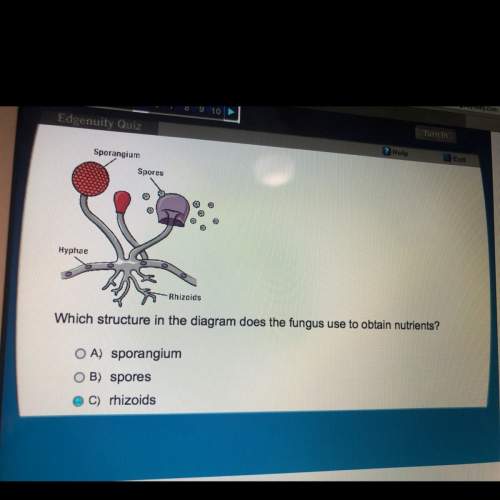
Biology, 03.03.2020 22:01 xxleeciexx
The gradual change in an ecosystem in response to environmental change is called succession. From what you have learned, how is Mount St. Helen's an example of succession? Explain.

Answers: 3
Another question on Biology

Biology, 21.06.2019 19:00
4.06 hc)a five-year review of threats to the southern resident orca population of the united states concluded that the top threats were prey availability, contaminants, and effects from recreational and whale watching vessels. further down the list are oil spills, disease, and effects from commercial vessels not targeting whales. how might this list be different if it were for transient whale populations, which have a larger average population size and live farther offshore in open waters? a)the transient population is more likely to be affected by contaminants. b)the transient population is less likely to be affected by whale watching vessels. c)the transient population is more likely to be affected by disease. d)the transient population is less likely to be affected by prey availability.
Answers: 1

Biology, 22.06.2019 00:30
On a recent expedition to a remote region of northern canada, scientists uncovered skeletal remains from about 100,000 years ago. surprisingly, all the skeletal remains, which included many species from differing biological families and spanned about two thousand years, showed evidence of experiencing temperatures in excess of 1000 degrees fahrenheit (or 538 degrees celsius). which of the following, if true, best explains the apparent paradox between the cold environment and the evidence of the bones experiencing hot temperatures? (a) chemical changes that naturally occur during the process of decay in only one north canadian species produce the same evidence of the species' skeletons being exposed to hot temperatures as the expedition scientists found. (b) a little over 103,000 years ago, a large fire is known to have occurred in northern canada. (c) strong evidence exists that as early as 70,000 years ago, homo sapiens around the world relied heavily on fire to cook animals. (d) in the same expedition and in roughly the same layer of excavation, scientists found rudimentary wood cutting and hunting tools used by early humans.
Answers: 3

Biology, 22.06.2019 08:10
A3 year-old is brought to the burn unit after pulling a pot of hot soup off the stove and spilling it on herself. she sustained 18% second degree burns on her legs and 20% third degree burns on her chest and arms. total body surface area burned is 38%. what icd-10-cm codes are reported for the burns (do not include external cause codes for the accident)?
Answers: 1

Biology, 22.06.2019 08:50
You are observing different types of cells in your science lab. one cell has many chloroplasts. what is the most likely function of this cell? a. energy production b. photosynthesis c. reproduction d. digestion
Answers: 1
You know the right answer?
The gradual change in an ecosystem in response to environmental change is called succession. From wh...
Questions



English, 02.02.2020 18:50

Mathematics, 02.02.2020 18:50

Mathematics, 02.02.2020 18:50

Computers and Technology, 02.02.2020 18:50


Mathematics, 02.02.2020 18:50

Mathematics, 02.02.2020 18:50




Mathematics, 02.02.2020 18:50


History, 02.02.2020 18:50

History, 02.02.2020 18:50







